Origins
According to Lugbara oral tradition, a man called Ajua is the great-grandfather of Tara parishes. He wanted to see where Ono (River Enyau or Anyau - a tributary of River Nile also met by a river from Tara) ends, which would be its source. So he moved with his cows and found people dancing at a dog funeral in Onduparaka (a few kilometres north of Arua Town). He joined in the dance and was given a wife. She gave birth to Opodria who later birthed Naye, the father of the seven true parishes of Tara.

The Lugbara are an ethnic group who live mainly in the West Nile region of Uganda and in the adjoining area of the Democratic Republic of the Congo (DRC). They speak the Lugbara language, a Central Sudanic language similar to the language spoken by the Madi, with whom they also share many cultural similarities. They are also found in South Sudan where they are known as Mundu and other names.

Oral tradition, or oral lore, is a form of human communication wherein knowledge, art, ideas and cultural material is received, preserved and transmitted orally from one generation to another. The transmission is through speech or song and may include folktales, ballads, chants, prose or verses. In this way, it is possible for a society to transmit oral history, oral literature, oral law and other knowledge across generations without a writing system, or in parallel to a writing system. Religions such as Buddhism, Hinduism and Jainism, for example, have used an oral tradition, in parallel to a writing system, to transmit their canonical scriptures, secular knowledge such as Sushruta Samhita, hymns and mythologies from one generation to the next.
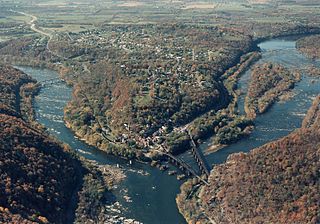
A tributary or affluent is a stream or river that flows into a larger stream or main stem river or a lake. A tributary does not flow directly into a sea or ocean. Tributaries and the main stem river drain the surrounding drainage basin of its surface water and groundwater, leading the water out into an ocean.
Ajua left Onduparaka on his quest and went to Ovisoni (West of Arua Town). There he also found people dancing and was allowed to join them. He was given another wife. Some say he paid bride price. The woman gave birth to Otu (Lugbara for Umbilical cord ), the father of Vurra - after whom a county was named in Arua District. The actual source of the river is in Vurra, not far from the DR Congo border.

Bride price, bridewealth, or bride token, is money, property, or other form of wealth paid by a groom or his family to the family of the woman he will be married to or is just about to marry. Bride price can be compared to dowry, which is paid to the groom, or used by the bride to help establish the new household, and dower, which is property settled on the bride herself by the groom at the time of marriage. Some cultures may practice both dowry and bride price simultaneously. Many cultures practiced bride pricing prior to existing records.

In placental mammals, the umbilical cord is a conduit between the developing embryo or fetus and the placenta. During prenatal development, the umbilical cord is physiologically and genetically part of the fetus and normally contains two arteries and one vein, buried within Wharton's jelly. The umbilical vein supplies the fetus with oxygenated, nutrient-rich blood from the placenta. Conversely, the fetal heart pumps low oxygen containing blood, nutrient-depleted blood through the umbilical arteries back to the placenta.
A county is a geographical region of a country used for administrative or other purposes, in certain modern nations. The term is derived from the Old French conté or cunté denoting a jurisdiction under the sovereignty of a count (earl) or a viscount. The modern French is comté, and its equivalents in other languages are contea, contado, comtat, condado, Grafschaft, graafschap, Gau, etc..
Otu is the step-brother of Opodria, the grandfather of the other Vur(r)a, a parish in Tara Subcounty which encompasses the villages from East /West Kololo (the Subcounty Headquarters), Pajuru to Odupiri. Vur(r)a's six brothers after whom parishes are named in Tara include Ojapi, Ajulepi, Yidu (Pajama Area), Oliapi (Oliyepi), Aruwe and Rendu.
Tara Hills and Rocks
Two of the highest mountains in the whole of West Nile can be seen while in Tara, that is Mt. Wati (in Terego County) and Mt. Liru on the Koboko side of Lurujo Road. You can get a customized view when you sit on top of the wide rock in Tara named Komendaku (translated as You don't need to search for a chair!). Adventurers and tourists write their names on the rocks and take small ones as souvenirs plus for research purposes. Red monkeys, rock badgers, porcupines and other interesting animals can be found near some of these rocks.

West Nile sub-region is a region in north-western Uganda, Northern Uganda.

A rock is any naturally occurring solid mass or aggregate of minerals or mineraloid matter. It is categorized by the minerals included, its chemical composition and the way in which it is formed. Rocks are usually grouped into three main groups: igneous rocks, metamorphic rocks and sedimentary rocks. Rocks form the Earth's outer solid layer, the crust.
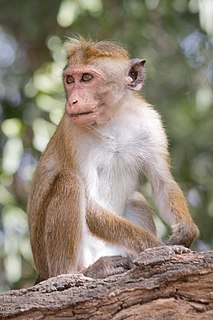
Monkey is a common name that may refer to groups or species of mammals, in part, the simians of infraorder Simiiformes. The term is applied descriptively to groups of primates, such as families of new world monkeys and old world monkeys. Many monkey species are tree-dwelling (arboreal), although there are species that live primarily on the ground, such as baboons. Most species are also active during the day (diurnal). Monkeys are generally considered to be intelligent, especially the old world monkeys of Catarrhini.
When you stand at the soccer field of Ojapi Primary School, the ranges anticlockwise from Mt. Liru include Kodro, Gala, Kadri, Adrofiya and Njeke (or Njakai). On the south side of Ojapi as you move from Oliapi Primary School to Orani (which also has a rock named after the place), you will see Adada and Luturujo (which translates as The House of/ on a Hill).
Despite all these rocks, the farmlands are very productive and agriculture is the predominant economic activity. Crops grown include maize, cassava, ground nut, soya, coffee and beans. Tobacco locally regarded as Assets is grown as a major cash crop. Animals are also reared including cows, goats, sheep, guineafowls, chicken plus pigs. On market days like at Mabira, Ajira, Gili Gili and Odupiri, people sell foodstuffs and other household items as the sun sets. The grasshopper is a staple food and Emblem for Maracha, a Lugbara clan.

Agriculture is the science and art of cultivating plants and livestock. Agriculture was the key development in the rise of sedentary human civilization, whereby farming of domesticated species created food surpluses that enabled people to live in cities. The history of agriculture began thousands of years ago. After gathering wild grains beginning at least 105,000 years ago, nascent farmers began to plant them around 11,500 years ago. Pigs, sheep and cattle were domesticated over 10,000 years ago. Plants were independently cultivated in at least 11 regions of the world. Industrial agriculture based on large-scale monoculture in the twentieth century came to dominate agricultural output, though about 2 billion people still depended on subsistence agriculture into the twenty-first.

Maize, also known as corn, is a cereal grain first domesticated by indigenous peoples in southern Mexico about 10,000 years ago. The leafy stalk of the plant produces pollen inflorescences and separate ovuliferous inflorescences called ears that yield kernels or seeds, which are fruits.
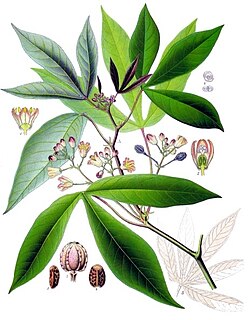
Manihot esculenta, commonly called cassava, manioc, yuca, macaxeira, mandioca and aipim, is a woody shrub native to South America of the spurge family, Euphorbiaceae. Although a perennial plant, cassava is extensively cultivated as an annual crop in tropical and subtropical regions for its edible starchy tuberous root, a major source of carbohydrates. Though it is often called yuca in Latin American Spanish and in the United States, it is not related to yucca, a shrub in the family Asparagaceae. Cassava is predominantly consumed in boiled form, but substantial quantities are used to extract cassava starch, called tapioca, which is used for food, animal feed, and industrial purposes. The Brazilian farinha, and the related garri of West Africa, is an edible coarse flour obtained by grating cassava roots, pressing moisture off the obtained grated pulp, and finally drying it.
The Lugbara live in the Democratic Republic of the Congo and Uganda. In Lugbara mythology, Adroa appeared in both good and evil aspects; he was the creator god and appeared on Earth as a man who was near death. He was depicted as a very tall white man with only one half of a body, missing one eye, one leg, etc. His children were called the Adroanzi.

Nile Gregory Rodgers Jr. is an American record producer, songwriter, musician, composer, arranger and guitarist. The co-founder of Chic, he has written, produced, and performed on records that have cumulatively sold more than 500 million albums and 75 million singles worldwide. He is a Rock and Roll Hall of Fame inductee, a three-time Grammy Award-winner, and the chairman of the Songwriters Hall of Fame. Known for his "chucking" guitar style, Rolling Stone wrote in 2014 that "the full scope of Nile Rodgers' career is still hard to fathom."
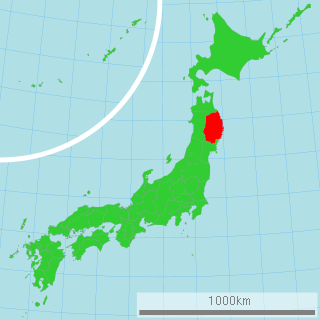
Iwate Prefecture is a prefecture in the Tōhoku region of Japan. Located on the main island of Honshu, it contains the island's easternmost point. The capital is Morioka. Iwate has the lowest population density of any prefecture outside Hokkaido. Famous attractions include the Buddhist temples of Hiraizumi, including Chūson-ji and Mōtsū-ji with their treasures, Fujiwara no Sato, a movie lot and theme park in Esashi Ward, Oshu City, Tenshochi, a park in Kitakami City known for its big, old cherry trees and Morioka Castle in Morioka City.

Molson Canadian Rocks for Toronto was a benefit rock concert that was held in Toronto, Ontario, Canada on July 30, 2003. It was also known as "Toronto Rocks", "Stars 4 SARS", "SARSStock", "SARSfest", "SARS-a-palooza", the "SARS concert", or, more descriptively, "The Rolling Stones SARS Benefit Concert". Estimated to have between 450,000 and 500,000 people attending the concert, it is the largest outdoor ticketed event in Canadian history, and one of the largest in North American history.

Red Rocks Amphitheatre is an open-air amphitheatre built into a rock structure near Morrison, Colorado, 10 miles (16 km) west of Denver. There is a large, tilted, disc-shaped rock behind the stage, a huge vertical rock angled outwards from stage right, several large outcrops angled outwards from stage left and a seating area for up to 9,525 people in between. At its height, the amphitheatre sits at 6,450 feet (1,970 m) above sea level, and the surrounding Red Rocks Park covers 868 acres. The amphitheater is owned and operated by the City and County of Denver, Colorado and is located in Red Rocks Park, part of the Denver Mountain Parks.
Onjo was the founding monarch of Baekje (백제,百濟), one of the Three Kingdoms of Korea. According to the Samguk Sagi, he founded the royal family of Baekje.
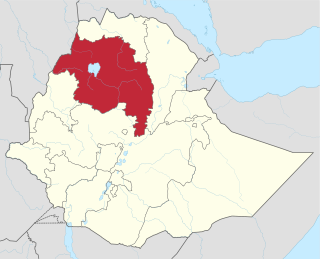
Amhara Region is one of the nine ethnic divisions of Ethiopia, containing the homeland of the Amhara people. Previously known as "Region 3", its capital is Bahir Dar. Ethiopia's largest inland body of water, Lake Tana, which is the source of the Blue Nile river, is located within Amhara. The region also contains the Semien Mountains National Park, which includes Ras Dashan, the highest point in Ethiopia. Amhara is bordered by the state of Sudan to the west and northwest, and in other directions by other regions of Ethiopia: Tigray to the north, Afar to the east, Benishangul-Gumuz to the west and southwest, and Oromia to the south.

Arua District is a district in the Northern Region of Uganda. Like many other Ugandan districts, it shares its name with its administrative center of Arua.

Yumbe District is a district in Northern Region, Uganda. Like most other Ugandan districts, it is named after its 'chief town', Yumbe, where the district headquarters are located.

Gumla district is one of the twenty-four districts of Jharkhand state, India, and Gumla town is the administrative headquarters of this district.
Articles related to Uganda include:

Real People is the fourth studio album by American R&B band Chic, released on Atlantic Records in 1980. It includes the singles "Rebels Are We", "Real People", and "26".
Tara Jane McDonald is an English-Irish songwriter and vocalist signed to Play Two/Warner Records.
Caesar Okhuti is a Ugandan footballer who plays for KCCA FC. He was loaned to Onduparaka FC for the 2016/17 season. Also known as Samson, he was born in Arua on 7 October 1990. He has an eye for goal, power, pace and can shoot from distance with both feet.

Lugbara cuisine is one of the meals of East Africa and the ancient Lado Enclave. The Lugbara people of northwestern Uganda and northeastern DR Congo eat not only vegetable dishes, but also animals like goats, cows plus ope (guineafowls) and catch insects like onya for food which is called nyaka in the standard Lugbara language used in Arua. Cassava flour sometimes mixed and mingled with millet or sorghum like posho or ugali is the staple food and is called enya(sa) [kalo or atap(a) in Ateso, fufu in West Africa] accompanied with a range of soup dishes. Rice, yams, potatoes and matoke are also eaten. Below is a list of some of the Lugbara-styled delicacies you can find in West Nile Restaurants, Ariwara Town, Arua Park in Kampala and many homes or cafeterias that cherish traditional Lugbara cuisine.
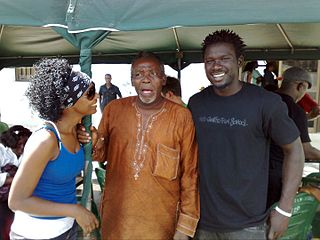
Joel Okuyo Atiku Prynce is a Ugandan actor, model, photographer and lecturer at Uganda Christian University where he graduated with a Bachelor of Social Work and Social Administration (BSWSA) plus Makerere University, the Best Two Campuses in Uganda. His film acting breakthrough came when he was cast as the Devil's reincarnation in Ugandan director Matt Bish's 2007 Film Battle of the Souls, a popular Ugawood Movie. It was based on the real-life story of the director's brother, KFM Radio Presenter Roger Mugisha. Joel is also the President of his own company The Lhynnq-X, Inc. Born in Arua on 4 December 1983 to a Lugbara couple, Major Gabriel Francis Atiku and Yema Drakuru Atiku, his debut villain role won him over five international accolades including Best Supporting Actor at the Balafon Film Festival in Bari, Italy (2008) and 2009's Best Actor in Supporting Role at the African Movie Academy Awards (AMAA) in Lagos, Nigeria. Other awards include Best Actor at both Ubuntu Village, Colorado (USA) in 2010 and the 2011 Zanzibar International Film Festival [ZIFF] in Tanzania. Ugandan newspaper The Observer labelled Okuyo Africa's Brad Pitt.
Agofe is the noble title for the chief cultural leader or king among all the Lugbara people. The term means 'Pillar' but a king is also called opi in Lugbara. An opi is usually the clan leader of a lineage. In 2012, the Government of Uganda finally recognised this revised institution. The Agofe's duty will be to preserve Lugbara culture through writings and other assignments.
Lugbara music refers to music performed in Lugbara. It can be a folk song, musical proverb or modern pop music. The general term for music in Lugbara is ongo.
Onduparaka FC is a Ugandan football club currently playing in the Ugandan Premier League. They play home games at Greenlight Stadium in Onduparaka, a suburb of Arua. The club's name means 'sorghum stem' in the Lugbara language while motto is: The struggle continues.
























